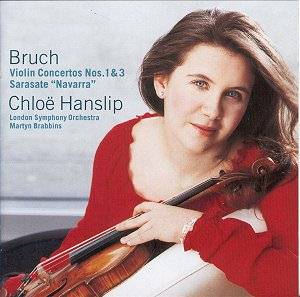There is no doubt about the talent of
the young violinist Chloë Hanslip. Strip away the hype (not helped by
some appalling booklet photographs, including one in a Toulouse-Lautrec-like
pose on the ‘wobbly’ Millennium Bridge in London in which she appears
to be freezing cold) and the rest is admirable, and I lauded her first CD fairly
unequivocally. That she is technically up to the task is in no doubt,
on the other hand her emotional level is currently fired by the freshness
of youth matched by enthusiasm and love of the music she plays, and
Bruch’s first concerto is clearly one such work. True, she over-indulges
here and there, the pauses and some of the slowing downs she inserts
are excessive, but the finale catches fire and she more than rises to
its challenges. Brabbins and the LSO provide matching accompaniments
(what Hanslip, inevitably for her age, lacks in angst, the orchestral
sound more than compensates for) and just about keep up when, coming
down the final straight, Hanslip puts her foot down hard on the accelerator
pedal and rushes to the finishing line. She tackles the third concerto
head-on, technically far harder than the first, a brave choice and an
excellent performance too, full of muscle in the outer Allegros and
lyrically sensitive in the Adagio, though occasional misjudgements of
intonation in wide leaps from one end of her borrowed Guaneri del Gesu
to the other are hopefully not going to develop into bad habits.
There’s a nice concluding filler with
her partner from her Brit Awards appearance, Mikhail Ovrutsky, in the
unusual Navarra by the Spanish virtuoso Sarasate (who worked
closely with Bruch on more than one occasion), performed by both of
them with plenty of stylish Spanish flavour and technical panache, guitar-imitations
and all. All ‘too silly’ as the Major used to say when interrupting
Monty Python sketches, but great fun nonetheless.
Julian Haycock’s booklet notes no doubt
made full use of my biography, to which I have no objection whatsoever,
though it’s a pity that in so doing, he did not correct my original
error in mathematics when I described Bruch’s wife Clara as sixteen
years old when he married her in 1880, when she was in fact ten years
older than that (born in 1854). Other factual errors also need correction.
Max stayed with her till the end of her days, not the other way around
for she predeceased him by a year, and it was Cambridge, not Oxford,
which awarded him an Honorary Doctorate in 1893. Neither do I recall
that the first violin concerto ‘thrilled the first night, creating a
sensation’. Apart from Bruch quoting from Joachim’s letter to the composer
that it had ‘a resounding success’, therefore we are relying on double
hearsay, we have no reports of that performance. As to Ferdinand David
(hardly ‘elderly’ at 58), described as ‘was allowed to put his oar in’
with a performance, it somehow sits ill as a version of the events.
By the way, not all the photos are bad and some bear an uncanny resemblance
to Tasmin Little - no bad comparison there either.
Christopher Fifield
